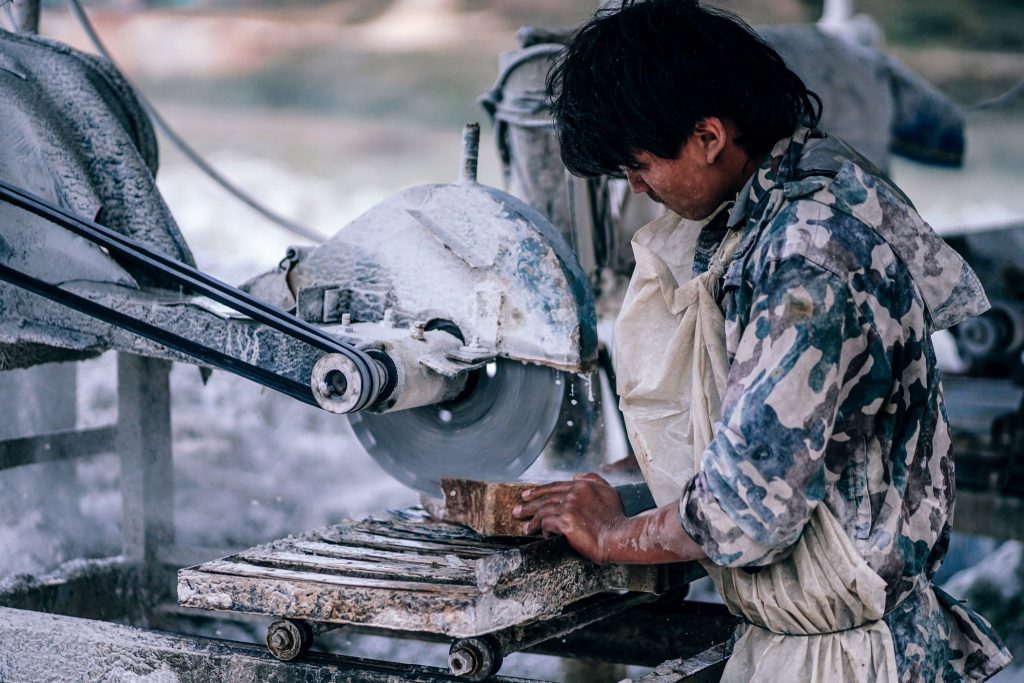During the month of December 2021, AMBITION will be highlighting its top 25 most-read articles of the year in reverse order, in the form of a thought leadership advent calendar. Here’s what is behind today’s door.
Business leaders must explore the systemic underpinnings of our modern economy, in order to eradicate modern slavery, writes Jennifer Wascak
Originally published 5 February 2019.
In November 2017, shoppers at the international fashion retailer Zara discovered handwritten notes stitched inside clothing that contained pleas for help.
The notes were reportedly placed there by workers in Turkey’s Bravo Tekstil factory, which supplied garments to Zara and other brands before closing down suddenly in 2016.
In their hand-stitched notes, the workers asked shoppers to support their campaign for better working conditions and to pressure Zara to pay them the wages to which they were entitled. Following a public outcry and a high-profile media campaign, Zara set up a fund to pay the workers the wages they were owed, and the story gradually faded from the public eye.
The Zara incident gave fleeting exposure to a much larger issue – worker exploitation that has grown to a level never before seen in our world economy, in which an estimated 40 million people are currently living as modern slaves.
In the past decade, NGOs, human rights activists and the media has accelerated its work exposing horrific accounts of modern-day slaves, trafficked to work for little or no money in factories, farms, mines, brothels, the construction industry, warehousing and manufacturing. Law enforcement officials are stepping up their efforts to investigate and disrupt the traffickers, while government bodies debate the policy changes and use of resources to support identified victims and prevent them from being re-trafficked.

But the latest frontier in the fight against modern slavery, which forces businesses to be transparent about, and accountable for, outsourcing practices in their organisations’ supply chains, has the potential to wield the most power. It is based on the recognition that, in recent decades, mainstream global businesses have directly and indirectly created this $150bn modern slavery industry and enabled it to grow and thrive. The
new legislation targeting slavery in the mainstream economy is requiring businesses to wield the same power and influence to expose and reverse this alarming trend.
A fast-growing ‘industry’
Modern slavery is the second largest and fastest-growing criminal industry in the world, producing $150bn in annual profits globally, according to the International Labour Organisation (ILO). The ILO also reports that, of the 40 million people understood to be modern-day slaves, 29.4 million are in forced labour, with another 15.4 million in forced marriages. Seven in 10 victims (71%) are female, and one in four are children. On average, they are held for 20.5 months before escaping or being freed (according to ILO’s report entitled Global Estimates of Modern Slavery: Forced Labour and Forced Marriage, 2017).
Modern slavery is a situation of exploitation from which a person cannot leave due to threats, violence, coercion or deception. It includes forced labour, sex trafficking, oppressive and dangerous working conditions, debt bondage, forced marriage, human trafficking and organ harvesting.
Although slavery can conjure up images of people captured, chained and sold across the globe, as was prevalent during the Transatlantic slave trade of the 16th-19th centuries, chattel slavery is thought to be the least prevalent of the contemporary forms of slavery. While these traditional forms of slavery do still exist in some areas of the world, they tend to occur in areas where war or extreme forms of prejudice and oppression have resulted in the dehumanisation of certain classes of human beings, usually for ethnic, caste, misogynistic or religious reasons.
More commonly, victims of labour exploitation enter into relationships with their captors voluntarily, and are not physically restrained. Instead, most people fall victim to modern slavery through a combination of vulnerability, psychological coercion and, most commonly, debt bondage or indentured servitude.

Victims are mostly low-skilled labourers and migrant workers whose life choices are limited or non-existent due to their circumstances of birth. These are the people most likely to indenture themselves for the false promises of better opportunities to provide for their families in a distant city or country.
In a study (entitled ‘A Portrait of Low-Income Migrants in Contemporary Qatar’) published in the Journal of Arabian Studies in 2013 by Andrew Gardener, Professor of Anthropology at the University of Puget Sound and his colleagues, 91% of low-skilled foreign workers in the Persian Gulf borrowed money to pay their recruitment fees, travel costs, and visa expenses. While 44% had written contracts of employment before leaving, 78% of those contracts would be changed upon arrival at their country of destination; 90% of the workers in this study had their passports confiscated and held by their employers.
In these circumstances, it is easy to see how the promise of a good job in a developing region can quickly deteriorate into long hours with little pay, and no ability or funds to return home. In the case of illegal migrants, the potential to exploit is even greater, as these individuals are reluctant to risk detention and deportation by making themselves known to authorities.
Forced labour can be found in virtually every industry. In the cases where the type of work was known, 24% of adults were domestic workers, 18% were in construction, 15% in manufacturing, and 11% in agriculture and fishing. An estimated 3.8 million adults were victims of forced sexual exploitation and 1 million children were victims of sexual exploitation (ILO, 2017).
However, it is impossible to know exactly how many people are living in modern slavery, and different studies have produced different estimates. One reason for this is that modern slavery is a hidden crime that is difficult to identify. Another is that different studies use different definitions of slavery, with some including forced marriage, for example, while others do not.

Irresponsible corporate practices
The sad truth for business leaders is that modern slavery is driven, in large part, by irresponsible corporate practices and unrealistic consumer demands. While criminal trafficking networks capitalise on the exploitation of the vulnerable, they are simply servicing the industries whose business models depend on cheap overseas labour and the production of consumer goods at low prices. In other words, modern slavery is deeply embedded in our global economy.
Poverty and globalisation are typically cited as the root causes of modern slavery that have enabled it to grow and thrive. But attributing its rise to these two factors, ostensibly inevitable and seemingly beyond our control, is both over-simplistic and disingenuous.
‘Excuses rather than explanations’
According to Dr Genevieve Lebaron, Senior Lecturer in the Department of Politics at the University of Sheffield, poverty and globalisation serve as ‘excuses’ rather than ‘explanations’, for modern slavery. She asserts that it is more important to understand exactly which aspects of poverty and globalisation are responsible for the endemic labour exploitation, and which global economic processes are ensuring the constant and low-cost supply of highly exploitable and coerced workers.
Far from being an inevitable consequence of globalisation, modern slavery is actually the result of restrictive migration regimes, irresponsible outsourcing practices, the growing gap between rich and poor, and the deregulation and consolidation of corporate power that drives the creation of short-term profits that typically benefit only the rich.
Although legal accountability for human trafficking crimes is important, no meaningful progress in the fight against human trafficking will occur until law makers and business leaders become serious about addressing these systematic underpinnings of our modern economy. And, while there has been some movement in this area, the world’s response must go far beyond an expression of outrage.
Addressing the true root causes of modern slavery requires recognition and an honest evaluation of neoliberalism and trickle-down economic theory that underlies our modern form of capitalism, an undertaking that is certain to be more economically disruptive and politically controversial than simple espousing its evils with an official policy declaration and commitment of law enforcement and victim resources.
In saying that, the work of academia and civil society organisations over the past few decades is beginning to pay off. The result is a rise in the adoption of modern slavery legislation across the globe that recognises the critical role of a fully engaged business community working to solve the crisis it has inadvertently and collectively created.

The impact on business
Recognising the extent to which modern slavery practices have become embedded in our global economy, the California Transparency in Supply Chains Act, which came into effect on 1 January 2012, was the first piece of anti-slavery legislation directed at consumers and businesses that are inadvertently promoting and sanctioning modern slavery through the purchase of goods and products that have been tainted in the supply chain.
This groundbreaking legislation required large retailers and manufacturers to start providing consumers with information regarding their efforts to eradicate slavery and human trafficking in their supply chains; educate consumers on how to purchase goods produced by companies that responsibly manage their supply chains and, ultimately, improve the lives of victims of slavery and human trafficking. But its scope was limited, applying only to large businesses dealing in the sale of goods and services in the US state of California. Since then, anti-slavery legislation has been rapidly spreading across the globe.
In 2015, the UK became the the first country with a national law requiring companies to disclose what they have done to ensure their supply chains are slavery free. Under the UK’s Modern Slavery Act, businesses with a global turnover of more than £36m ($47.5m USD) must produce an annual statement outlining the actions they have taken to combat forced labour within their supply chains. In addition to the US and UK, modern slavery legislation currently exists in France, has been recently introduced in Hong Kong, and is soon to come into effect in The Netherlands (2020) and
Australia (2018). These laws are modeled on the California Act and apply to organisations that have any businesses dealings in these countries – not just businesses whose revenue generated in that country exceeds the threshold.
The impact of the anti-slavery legislation is not limited to companies that do, or plan to do, business in the US, UK, France, Hong Kong, the Netherlands, and Australia. Companies that are not directly subject to the mandatory reporting requirements of the legislation are still experiencing its secondary impact. These trickle-down effects typically take the form of human rights audits, mandatory risk assessments, supplier codes of conduct that demand sustainability, the protection of worker human rights, and the adoption of ethical recruitment and procurement policies, as well as in express contract provisions that require modern slavery due diligence for suppliers.
So even for businesses based, or selling products, in countries without modern slavery legislation, gone are the days when they can turn a blind eye to exploitative practices, regardless of their size or sector.
For many companies, however, understanding how their business practices may be enabling modern slavery, and identifying steps they need to take in response to the new requirements, is proving a formidable challenge. It’s common for companies to respond defensively to suggestions that their organisations or supply chains may be profiting from modern slavery.
Other companies may acknowledge that labour exploitation could be going on in their supply chains, but assert a ‘we have no control over that’ defense. There is also a tendency for companies to become overwhelmed by the new legislation and their sudden apparent responsibility for labour exploitation in countries far removed from their corporate bases of operation.

Strong leadership
For these companies, it is important that strong leadership drives their response and sets the culture for the rest of the organisation to follow. It is also important for companies to understand that they are not required to ensure modern slavery is not taking place in their supply chains. Rather, they simply must demonstrate that they are taking steps to identify their risks and take appropriate action to mitigate those risks.
Accepting that your organisation may unknowingly be enabling labour exploitation, investigating areas and practices that are deemed high risk, and being transparent about action being taken to address modern slavery goes a long way towards meeting the legal requirements, as well as protecting the brand.
Every business across the globe, regardless of size or sector, will soon be impacted by modern slavery legislation.
The legislation is in response to rising recognition that slavery has become imbedded into our global economy, and meaningful progress to stop its spread requires the resources, insight and active engagement of the business community. Strong corporate leadership is needed, as well as honest and open recognition of the modern corporate values, and the business structures and practices that inadvertently enable human exploitation to grow and thrive.
This requires Businesses Schools across the world to engage actively in the agenda. The long-term impacts of outsourcing cheap labour and paying lip service to issues of human rights and sustainability are a very real threat to our modern economy. Business leaders must be trained to understand this threat and the corporate values underlying it, which typically serve to benefit executives and shareholders with short-term profits at the expense of worker rights in further tiers of the supply chain. Likewise, Business Schools themselves have legal and moral duties to recognise their own roles as consumers of global goods and services by adopting anti-slavery programmes that include robust practices for ethical procurement and recruitment.
Corporate expansion, deregulation, mass consumerism, and consumer demand for cheaper goods have driven the growth of global inequality. It remains to be seen whether the impacts of modern slavery legislation will result in appropriate and effective human rights action that reverses this current alarming trend.
Jennifer Wascak is the founder of Sourcing Justice, a UK community interest company that helps businesses understand modern slavery and comply with anti-slavery legislation. A US-qualified lawyer, Jennifer is a former chief executive in state and local government who transitioned her career to human rights while obtaining her MBA in 2017 from the University of Westminster in London. In 2018 she was recognised as one of AMBA’s top-five MBA graduates in the world for her human rights work with a water and sanitation charity in Uganda, as well as her research of integration barriers for asylum seekers and refugees in East London.
Jennifer also works as a Guest University Lecturer on issues of corporate social responsibility, ethics in supply chains, and business and human rights. She structured her business as a social enterprise in order to provide professional services that make human rights initiatives affordable and accessible to businesses of all sizes. Sourcing Justice is supported by the Cambridge Judge Business School Centre for Social Innovation and partnered with the Cambridge Centre for Applied Research in Human Trafficking.
Find out more at www.sourcingjustice.org.uk.



